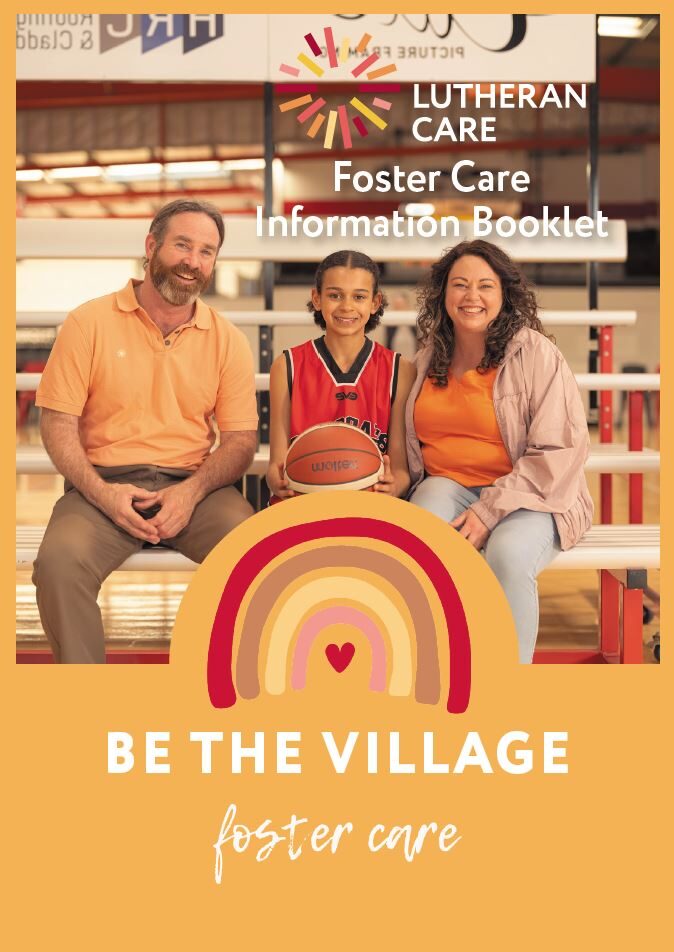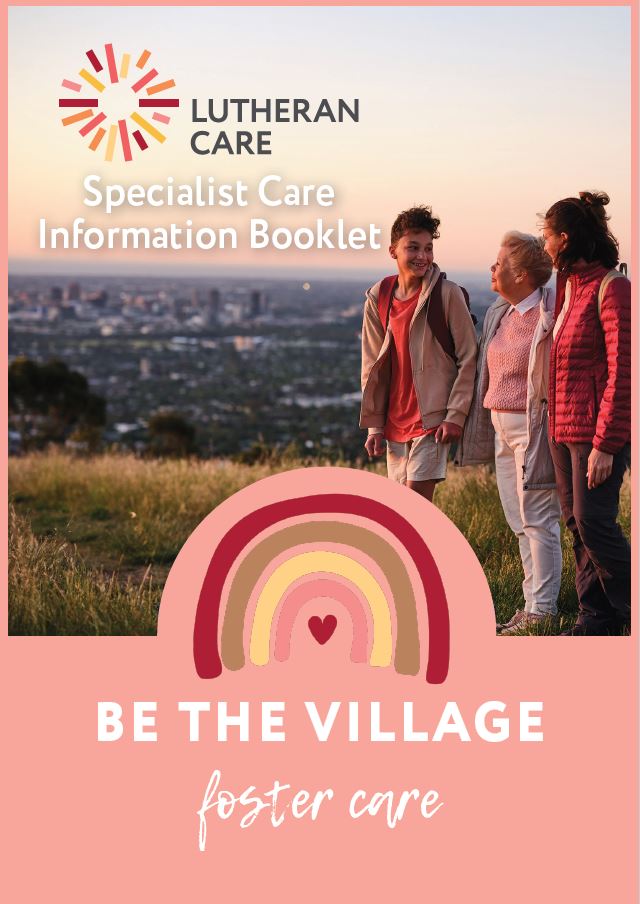Lutheran Care
Foster Care Information Sessions
Our commitment to recruiting Foster Carers for vulnerable children and young people in need remains one of our highest priorities.
We offer both online and in-person options to attend an upcoming Information Session. Both sessions are held live, facilitated by an experienced Lutheran Care Foster Care staff member. Information Sessions cover detailed information about different types of care we provide, the roles and expectations of foster carers, the nature and challenges of foster care and detailed information about what you can expect throughout the assessment and training process to become a foster carer. Information Sessions are a unique opportunity for you to ask any questions you may have and hear from both a staff member and a seasoned Foster Carer.
Throughout your journey to learn more about fostering and making an informed decision for you and your family, we are committed to providing you with honest and transparent information every step of the way.

Information Sessions
Foster Care
You never know where the road may take you. Register to attend an upcoming Information Session and take you first step to learn more.
Foster Care
Information Sessions
Register to attend a session.
You can register for a session by submitting the following form, and we will send you an email to confirm your registration. We will send you the link for joining the webinar the day before the session.
Upcoming Sessions
Foster Care Information Sessions are a great way for us to meet you and an opportunity for you to hear a bit more information about the process of becoming an approved Foster Carer.
To give you the best possible picture of what it’s like to be a Foster Carer, we also have an opportunity for you to hear from one of our current Foster Carers, to hear first hand about their fostering experiences.
Please see details above regarding our upcoming Foster Care Information Sessions.
If you would like to find out more about Foster Care prior to attending one of our Information Sessions, you can download our information booklet below.
Our Foster Care Information Session will also assist you to:
- Consider the implications of undertaking a Foster Care role, including how it may impact upon your family and friends
- Become better informed about the significant responsibilities of Foster Carers, and
- Consider what type of Foster Care may be best suited to your situation. Rest assured, you don't have to determine what type of care you prefer before you speak with us or submit your Registration of Interest.
The process of becoming a Foster Carer is designed to help inform and determine what type of care best matches your physical and emotional capacity, unique skillset, lifestyle and life experience.
Throughout your assessment journey, your allocated Assessment Worker can help you identify which type of care may best suit your strengths.
You can register for an information session by phone on (08) 8337 8787, email fostercare@lutherancare.org.au or register for an information session online.
Our Information Cessions run for approximately 90 minutes hours with a scheduled short break in the middle.

Foster Care Information Booklet
Download our Information Booklet

Specialist Care Information Booklet
Download our Information Booklet

Would you like to speak to someone about fostering?
We would be delighted to chat with you. Feel free to contact our team on 8337 8787 or submit an enquiry form and we'll be in touch with you. Let's have a chat about fostering and explore the possibilities of becoming a foster carer.
Lutheran Care
Be the Village.
To enquire about fostering, you can:
Call us on 08 8337 8787
We would be delighted to speak with you. Feel free to contact our friendly team for a confidential, personal conversation about your circumstances and how fostering might suit your lifestyle. We can chat with you when you call, or book a time when you and your partner/spouse are both free. We can have a chat over the phone or arrange a time to video chat via Zoom.
Submit our Online Enquiry form or email fostercare@lutherancare.org.au
If you would like us to contact you, send us an email or submit an Online Enquiry. From there we can arrange a time for a phone conversation or video chat via Zoom.
Register for an upcoming Information Session.
Our upcoming dates and details are below. When you register for an online Information Session we'll send you a confirmation email and prior to the session we'll send the link with helpful information about joining the webinar. When booking an in-person Information Session, we'll send you a reminder SMS the day before the session to confirm all the details.

Lutheran Care highly values the critical role of Foster Carers and the contributions that their friends and families make to the nurture of children and young people. We recognise that children belong and thrive in families and Foster Carers provide stable, supportive and nurturing homes to help children feel safe and secure while separated from their birth parents and siblings. There are different types of Foster Care including Long Term, Short Term and Respite across both Generalist and Specialist programs.
When Foster Carers invite children or young people in need to be a part of their family, whether that’s for a short time or a long time, it has the potential to be life-changing; for both the carers and the children. Fostering is both challenging and rewarding. Carers provide emotional support and care for a child’s day-to-day needs and support the child in their educational and recreational activities.
To become a Foster Carer, you will undergo an assessment process where your maturity, health and lifestyle is considered within the context of the type of care you would like to provide. Some of the characteristics and personal qualities of successful Foster Carers include flexibility, teamwork, communication, acceptance, playfulness and a commitment to lifelong learning. Carers are everyday members of the community who have a strong commitment to helping others, especially children. Unfortunately, our community needs more everyday people who are able to offer caring homes to children and young people who cannot live with their birth families. Foster Carers help children feel safe and secure while separated from their birth parents. Successful Foster Carers in both Generalist and Specialist Foster Care share many characteristics, however there is a unique eligibility criteria and skillset we are looking for in Specialist Foster Carers to meet the needs of children and young people in Specialist Care.
Children are at the centre of what we do, and we ‘the village for children and young people’ work together as a Care Team to meet the needs and serve the best interests of each individual child in care. Foster Carers, Lutheran Care (LC) Support Workers and Social Workers who work on behalf of the Department for Child Protection (DCP), actively participate in the Care Team to ensure that any decision which is made on behalf of the child is in the best interests of the child. Lutheran Care Foster Carers work with the child’s allocated DCP Case Worker and their Lutheran Care Support Worker as part of the Care Team to achieve the set goal or plan for the child.
Yes! Lutheran Care actively supports many Foster Carers who are single or are the sole resident of the home. Single Foster Carers can make great foster parents regardless of their sexual orientation. Couples can also foster. Couples can be married or in de facto relationships.
Absolutely! We proudly journey alongside and support many same-sex foster families who are each providing exceptional care to the children and young people in their care.
Yes, you can foster. The Foster Carer assessment is not dependent on your assets. However, you do need to demonstrate that you can provide safe and adequate accommodation where a child can live, play and sleep and that you are financially capable of supporting an additional child in your home. As part of the assessment process, pet hygiene and safety will be considered to determine that your home is suitable for caring for children and young people in care.
Every Foster Carer at Lutheran Care is allocated a dedicated Foster Care Case Worker (also known as a Foster Care Support Worker) who supports them in their fostering journey. Lutheran Care Support Workers journey with our Foster Carers to provide practical assistance, professional advocacy or a listening ear. Support workers can also advocate on behalf of the Foster Carer for training, resources or access to support services. We provide a 24/7 telephone line dedicated to our Foster Carers, so there is always someone from Lutheran Care at the other end of the phone to provide support, advice or assistance whenever it is needed.
Yes, there is a Foster Carer allowance paid to registered Foster Carers which varies depending on the needs of the children and young people in your care and the type of fostering you provide. In the general sense, this is considered financial assistance to reimburse and help cover the costs of the children in your care and is not considered an income.
Lutheran Care highly values the critical role of Foster Carers and the contributions that their friends and families make to the nurture of children and young people. We recognise that children belong and thrive in families and Foster Carers provide stable, supportive and nurturing homes to help children feel safe and secure while separated from their birth parents and siblings. There are different types of Foster Care including Long Term, Short Term and Respite across both Generalist and Specialist programs.
When Foster Carers invite children or young people in need to be a part of their family, whether that’s for a short time or a long time, it has the potential to be life-changing; for both the carers and the children. Fostering is both challenging and rewarding. Carers provide emotional support and care for a child’s day-to-day needs and support the child in their educational and recreational activities.
To become a Foster Carer, you will undergo an assessment process where your maturity, health and lifestyle is considered within the context of the type of care you would like to provide. Some of the characteristics and personal qualities of successful Foster Carers include flexibility, teamwork, communication, acceptance, playfulness and a commitment to lifelong learning. Carers are everyday members of the community who have a strong commitment to helping others, especially children. Unfortunately, our community needs more everyday people who are able to offer caring homes to children and young people who cannot live with their birth families. Foster Carers help children feel safe and secure while separated from their birth parents. Successful Foster Carers in both Generalist and Specialist Foster Care share many characteristics, however there is a unique eligibility criteria and skillset we are looking for in Specialist Foster Carers to meet the needs of children and young people in Specialist Care.
Children are at the centre of what we do, and we ‘the village for children and young people’ work together as a Care Team to meet the needs and serve the best interests of each individual child in care. Foster Carers, Lutheran Care (LC) Support Workers and Social Workers who work on behalf of the Department for Child Protection (DCP), actively participate in the Care Team to ensure that any decision which is made on behalf of the child is in the best interests of the child. Lutheran Care Foster Carers work with the child’s allocated DCP Case Worker and their Lutheran Care Support Worker as part of the Care Team to achieve the set goal or plan for the child.
Yes! Lutheran Care actively supports many Foster Carers who are single or are the sole resident of the home. Single Foster Carers can make great foster parents regardless of their sexual orientation. Couples can also foster. Couples can be married or in de facto relationships.
Absolutely! We proudly journey alongside and support many same-sex foster families who are each providing exceptional care to the children and young people in their care.
Yes, you can foster. The Foster Carer assessment is not dependent on your assets. However, you do need to demonstrate that you can provide safe and adequate accommodation where a child can live, play and sleep and that you are financially capable of supporting an additional child in your home. As part of the assessment process, pet hygiene and safety will be considered to determine that your home is suitable for caring for children and young people in care.
Every Foster Carer at Lutheran Care is allocated a dedicated Foster Care Case Worker (also known as a Foster Care Support Worker) who supports them in their fostering journey. Lutheran Care Support Workers journey with our Foster Carers to provide practical assistance, professional advocacy or a listening ear. Support workers can also advocate on behalf of the Foster Carer for training, resources or access to support services. We provide a 24/7 telephone line dedicated to our Foster Carers, so there is always someone from Lutheran Care at the other end of the phone to provide support, advice or assistance whenever it is needed.
Yes, there is a Foster Carer allowance paid to registered Foster Carers which varies depending on the needs of the children and young people in your care and the type of fostering you provide. In the general sense, this is considered financial assistance to reimburse and help cover the costs of the children in your care and is not considered an income.
